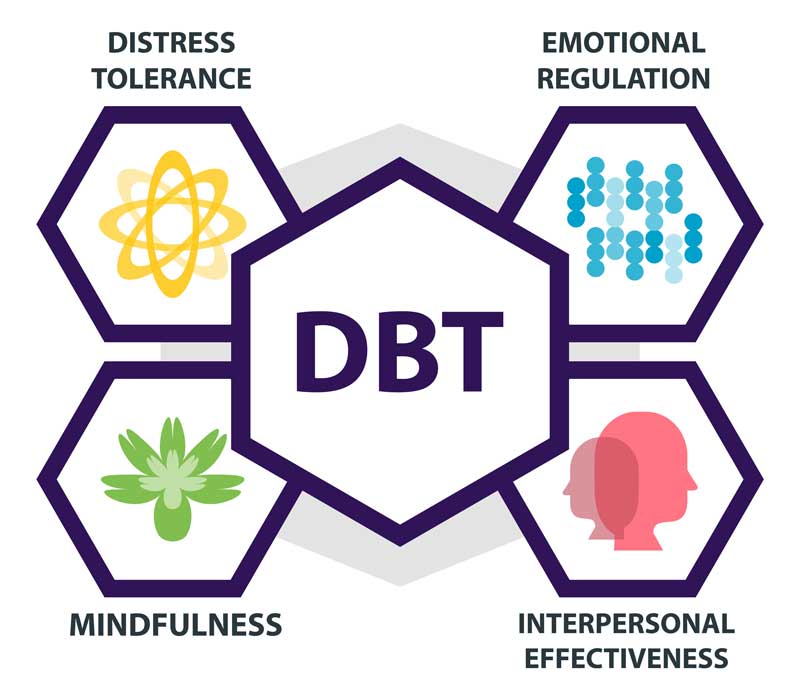Dialectical Behavior Therapy (DBT) Skills Groups


313 West Liberty Street, Ste. 224
Lancaster, PA 17603

Dialectical Behavior Therapy (DBT) Skills Group

- Our DBT Group is structured to teach important concepts and skills.
- This group will be open to both male and female identifying adults (18 and older).
- Group will be one hour sessions every other Thursday from 3:00PM - 4:00PM EST beginning 9/4/25 through 12/11/25 and will run for 7 sessions.
- Course Content by Week:
- Week 1 - DBT House and Assumptions
- Week 2 - Mindfulness: Core Skills
- Week 3 - IE: Dialectics
- Week 4 - Biosocial Theory
- Week 5 - Emotion Regulation: Opposite Action
- Week 6 - Distress Tolerance: Radical Acceptance/Willingness
- Week 7 - Behavioral Chain Analysis
Disclaimer: This is a general description. For specific details and to determine if these groups are right for you, please contact us or call 717-394-3994.
Most major insurance is accepted; check with your carrier to see if group coverage is available.
Why Do Patients Benefit from DBT Skills Groups?
DBT Skills Groups are often necessary even when patients are receiving in-person treatment, as individual therapy and group therapy serve different, complementary purposes within the overall DBT approach. DBT is a multifaceted treatment model, and skills groups are a critical component for helping patients develop the practical skills necessary to manage problems in their daily lives. Click the following link to find out more about Dialectical Behavior Therapy (DBT).
While in-person individual therapy is crucial for working on personalized issues specific to the patient, DBT Skills Groups are essential for systematically teaching the behavioral skills that form the foundation of DBT. Together, they create a comprehensive treatment plan that helps patients reduce emotional suffering, improve relationships, and achieve long-term stability and growth.
Why Patients Need DBT Skills Groups Alongside In-Person Treatment
- Focused Skill-Building: In individual therapy, the focus is primarily on addressing personal challenges and difficulties, exploring emotions, and troubleshooting situations that arise in the patient's life. While the therapist may incorporate DBT skills into sessions, the primary focus in individual therapy isn't teaching those skills systematically. DBT Skills Groups, however, are specifically designed to teach essential coping strategies in a structured and focused way. These sessions provide detailed instruction and practice in skills that may not be feasible to address fully in individual therapy.
- Practice and Application: Skills groups provide patients with the opportunity to regularly practice DBT techniques, including mindfulness, emotion regulation, distress tolerance, and interpersonal effectiveness, in a guided environment. Group settings reinforce learning by providing examples, exercises, and real-time feedback, ensuring patients can confidently apply skills outside of therapy sessions.
- Social Learning: In a group setting, patients can learn from the experiences and perspectives of peers who are facing similar struggles. Observing others practice and refine DBT skills can help reinforce lessons and provide diverse insights and approaches that individual therapy might not offer. Patients often realize that they are not alone in their struggles, which helps reduce stigma and feelings of isolation.
- Accountability: Skills groups offer a consistent structure and regular opportunities for progress monitoring. The group environment encourages accountability to both the therapist and peers, motivating patients to practice and integrate skills into their daily lives actively. Group participation can help patients stay engaged with their therapy and avoid lapses in skill use.
- Complements Individual Therapy: Individual therapy is tailored to the patient's needs and focuses on helping them apply DBT skills to their unique life situations. However, the time spent in individual therapy is limited and may not allow for the comprehensive, focused teaching of all DBT skills. DBT Skills Groups fill this gap by systematically teaching the skills in detail, while individual therapy focuses on applying those skills to the patient's specific challenges.
- Multi-Faceted Treatment: DBT is an integrative therapy model comprising four components: individual therapy, skills training, phone coaching (when necessary), and consultation teams for therapists. Skills groups are an essential component of this model, ensuring patients receive the full benefits of DBT. Without the groups, patients may miss out on key teachings and structured practice.
- Learning in a Collaborative Environment: The group environment provides unique therapeutic benefits. Patients are encouraged to collaborate, share experiences, and learn how their actions and communication affect others. This dynamic can be a crucial step in developing practical interpersonal skills.
DBT Certified Therapists at ACRS
Our counselors are trained in Trauma-Informed Care and have extensive experience helping individuals heal from traumatic experiences.
Chief Executive Officer

- Licensed Professional Counselor (LPC);
- Pa. Lic. PC006514
- Fl. Lic. TPMC1044
- Certified Traumatologist (CT)
- National Certified Counselor (NCC)
- Certified Clinical Mental Health Counselor (CCMHC)
- Certified Clinical Trauma Professional (CCTP)
- Certified in Emergency Crisis Response (CECR)
- Master of Arts (MA)
- 20+ years of clinical experience.
- Worked with clients across the lifespan.
Chief Clinical Officer

- Licensed Professional Counselor (PA-015668)
- Certified Dialectical Behavioral Therapist (C-DBT)
- Certified Clinical Trauma Professional (CCTP)
- Certified Dancing Mindfulness Facilitator (CDMF)
- Bachelor of Fine Arts (BFA)
Practiced in artistic expressionism, specifically dance and other performing arts.
Chief Administrative Officer

- Licensed Associate Professional Counselor (LAPC)
- Cognitive Processing Therapist (CPT)
Pre-licensed Clinician - Certified Grief Informed Professional (CGP)
Experience working with adolescents, couples, the elderly population, blended families, and families in the adoption process.
Take the First Step Towards Healing
Cheryl Wilson-Smith
Chief Executive Officer

- Licensed Professional Counselor (LPC);
- Pa. Lic. PC006514
- Fl. Lic. TPMC1044
- Certified Traumatologist (CT)
- National Certified Counselor (NCC)
- Certified Clinical Mental Health Counselor (CCMHC)
- Certified Clinical Trauma Professional (CCTP)
- Certified in Emergency Crisis Response (CECR)
- Master of Arts (MA)
- 20+ years of clinical experience.
- Worked with clients across the lifespan.
"I have over 20 years of experience in In-Person and Online Dialectical Behavior Therapy (DBT). I guarantee that the DBT Trauma and PTSD Therapy ACRS provides to our clients is of the highest quality in Pennsylvania".

